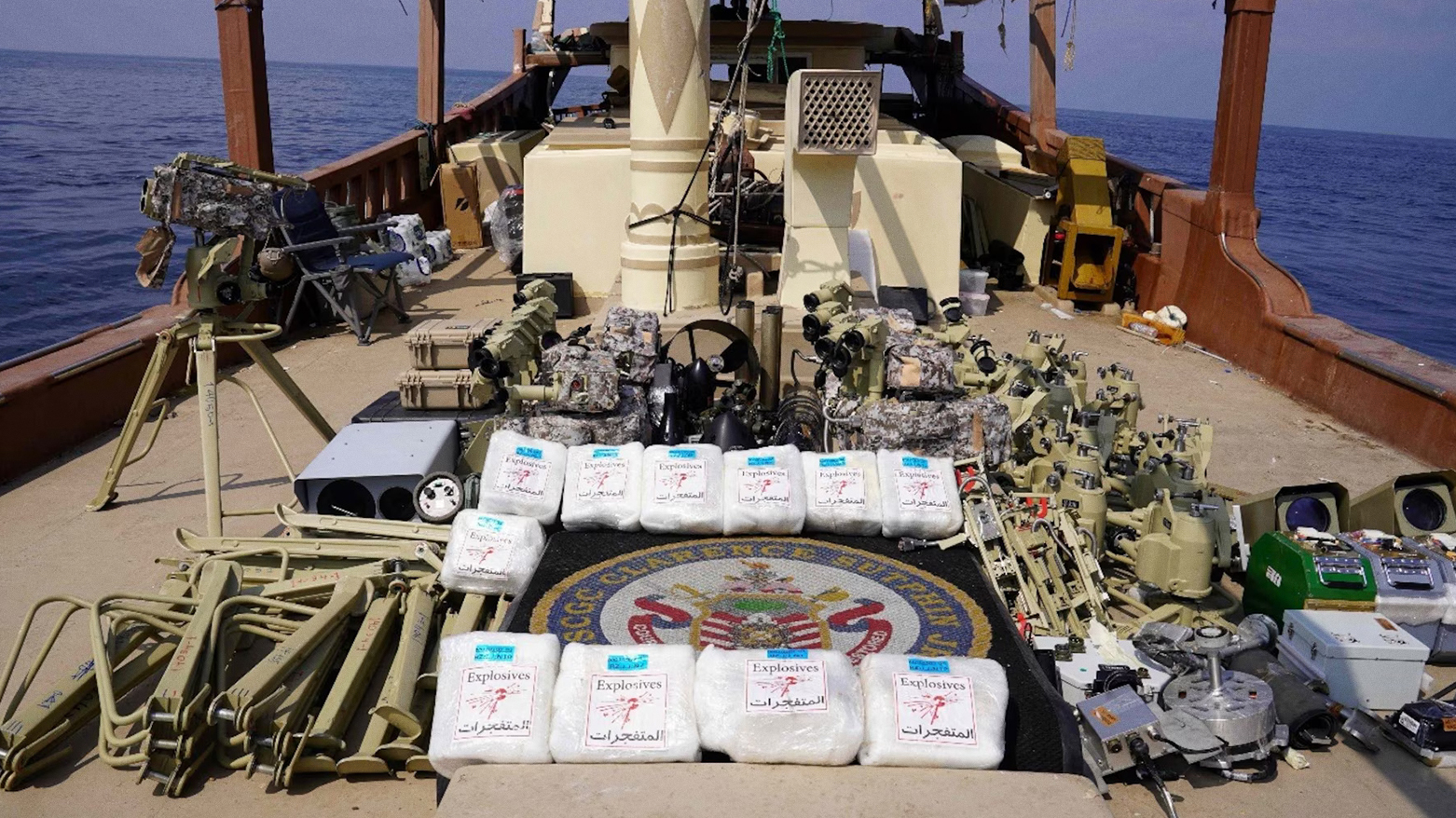U.S. Charges Four Men with Smuggling Iranian Arms to Yemen, as Houthi Attacks Continue
Despite the arrests, weapons seizures, and retaliatory attacks, the effect of the U.S. actions on the Houthis’ assaults on shipping has been limited.

WASHINGTON DC, United States (Kurdistan 24) – On Thursday, the U.S. charged four foreign nationals with smuggling arms from Iran to Yemen.
The four men were arrested on Jan. 11, after their dhow was stopped by CENTCOM’s naval forces, as they were carrying out Operation Prosperity Guardian, whose mission is to protect international shipping in the Gulf of Aden and the Red Sea against attacks by the Iranian-backed Houthis.
Two U.S. Navy Seals died, as they seized the dhow. One fell into the water, attempting to board the boat. A second man dove into the water in an attempt to save him, but both were lost.
The four men involved in the weapons smuggling carried Pakistani identity documents. However, official U.S. statements have refrained from describing them as Pakistani, perhaps because those documents could be false, and it may well be that their identities, including their nationalities, are unclear.
These arrests are being handled by the Justice Department. That contrasts with the policy of the George W. Bush administration after the 9/11 attacks.
Bush’s predecessor, Bill Clinton had treated terrorism as a law enforcement issue, handled by the Justice Department, with the focus on the arrest and conviction of individuals.
However, Bush put the military in charge of dealing with those detained in the course of the “war on terror.” Such individuals were tried by military commissions on territory outside the U.S.— at a U.S. facility in Cuba, at Guantanamo Bay.
But those legal proceedings have been dogged by controversy and delay. Indeed, over two decades later, key figures in the 9/11 attacks, including the mastermind, Khalid Sheikh Mohammed, have yet to face trial!
Read More: Guantanamo hearings reveal FBI-CIA disputes
The Biden administration appears to be reverting to earlier procedures.
Iranian Weapons Shipments to the Houthis
A Defense Intelligence Agency report, released earlier this month, described extensive Iranian arms transfers to the Houthis. The Houthis are entirely dependent on Iran for the weapons they use to attack international shipping!
Read More: U.S. Intelligence: Iran Supplying Houthis with Missiles, Drones
Regarding the case against the four men charged on Thursday, an FBI complaint, released by the U.S. Attorney’s Office for the Eastern District of Virginia, which is prosecuting the case, provided more details about Iranian arms transfers to the Houthis.
The dhow carrying the Iranian weapons was stopped on Jan 11 in the Arabian Sea, off the coast of Somalia. It was the first time that an Iranian weapons shipment to the Houthis had been interdicted since the Houthi attacks began last November, following the outbreak of the Israel-Hamas war.
The dhow departed from the port of Chah Bahar in eastern Iran. It lies close on Iran’s border with Pakistan. But the dhow did not travel directly to Yemen, which would have been the shortest route. Rather it was bound for Somalia.
Somalia is a lawless land and remains in a state of internal conflict, precipitated by the overthrow of the long-time dictator, Siad Barre over 30 years ago. Because of its lawlessness, Somalia is a good place to conduct illicit activities, such as those alleged by the FBI.
As the FBI complaint explained, “Iran uses non-military vessels, such as the dhow, to smuggle weaponry to other countries,” like Yemen.
A second ship was involved, as standard procedure involves a ship-to-ship transfer of the weapons,” the FBI explained. “The second ship then travels from the coast of Somalia to the Houthis in Yemen.”
The FBI also explained that on Jan. 5, about the time that the dhow left Chah Bahar, its captain, Muhammad Pahlawan, received a call on his mobile phone, from someone asking “if the stuff was loaded.”
He replied, “Yes, and we’re leaving Chah Bahar.”
As the dhow was sailing from Iran to Somalia, Pahlawan received four phone calls on his satellite phone from an individual associated with Iran’s Islamic Revolutionary Guard Corps (IRGC), the FBI said.
Moreover, on the day that his dhow was stopped and seized, Pahlawan twice tried to call his IRGC contact, but those calls were not answered.
Seized Weapons
After stopping and boarding the dhow, CENTCOM seized “Iranian-made advanced conventional weaponry,” the FBI complaint explained. Based on a preliminary analysis, that weapons cache appeared to include “critical components for medium range ballistic missiles and anti-ship cruise missiles, to include a warhead, and propulsion and guidance components.”
The weaponry was “packaged without markings, labels, or identification,” while it was held “in compartments near the front of the dhow,” the complaint continued. “Much or all of the weaponry was concealed inside tubing or among buoys.”
Some 17 days later, on Jan. 28, CENTCOM, operating again in the Arabian Sea, interdicted another Iranian weapons shipment to the Houthis.
CENTCOM seized “over 200 packages,” containing “medium-range ballistic missile components, explosives, unmanned underwater/surface vehicle components, military-grade communication and network equipment, anti-tank guided missile launcher assemblies, and other military components,” a CENTCOM statement explained.
Despite the weapons seizures, however, as well as retaliatory attacks, the effect of the U.S. actions on the Houthis’ assaults has been limited.
As Fox News reported on Thursday, following a Pentagon press conference by Deputy Press Secretary Sabrina Singh earlier that day, “Pentagon challenged on notion US strikes are deterring Houthi attacks.”
“Singh conceded there has been an increase in attacks over the past two to three days,” Fox stated.
Similarly, Noah Rothman, a senior author at National Review, wrote earlier this week, “The Houthis Are Not Deterred.“
And on Thursday, AFP reported, “Shipping insurance rates soar on Red Sea Missile Attacks.”